Bee Products
Bee Products – Incredible Health Benefits
Bee products are a natural gift from nature, offering not only exceptional taste but also a variety of health benefits. From honey to bee propolis – each product contributes to improved well-being, a stronger immune system, and overall body protection. Discover the incredible benefits that bee products can provide and how to incorporate them into your daily routine.
You can purchase quality bee products here.
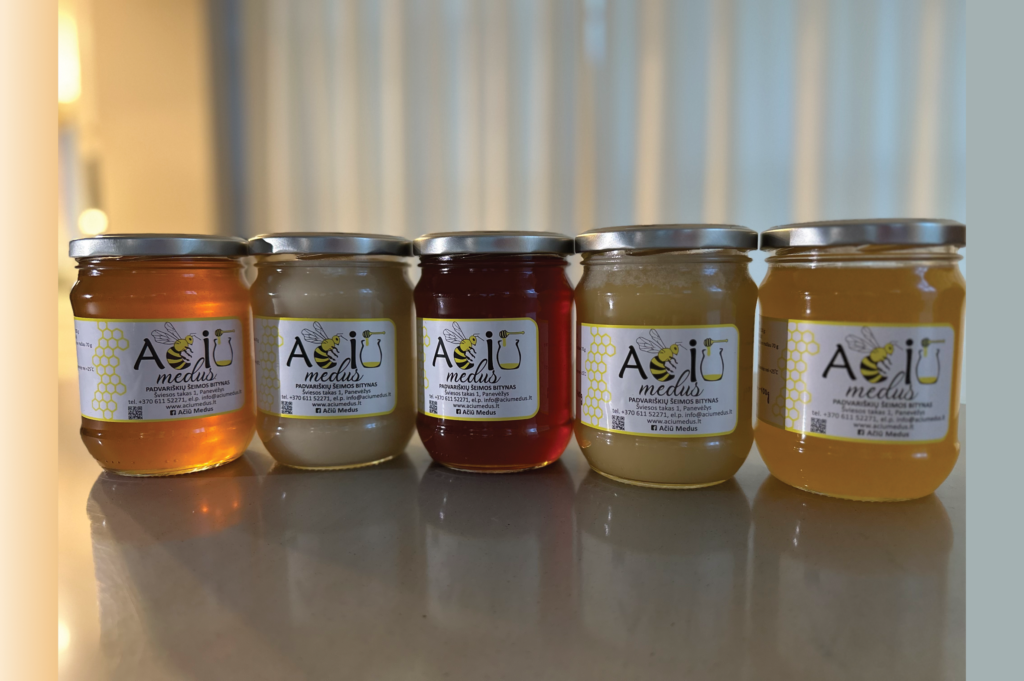
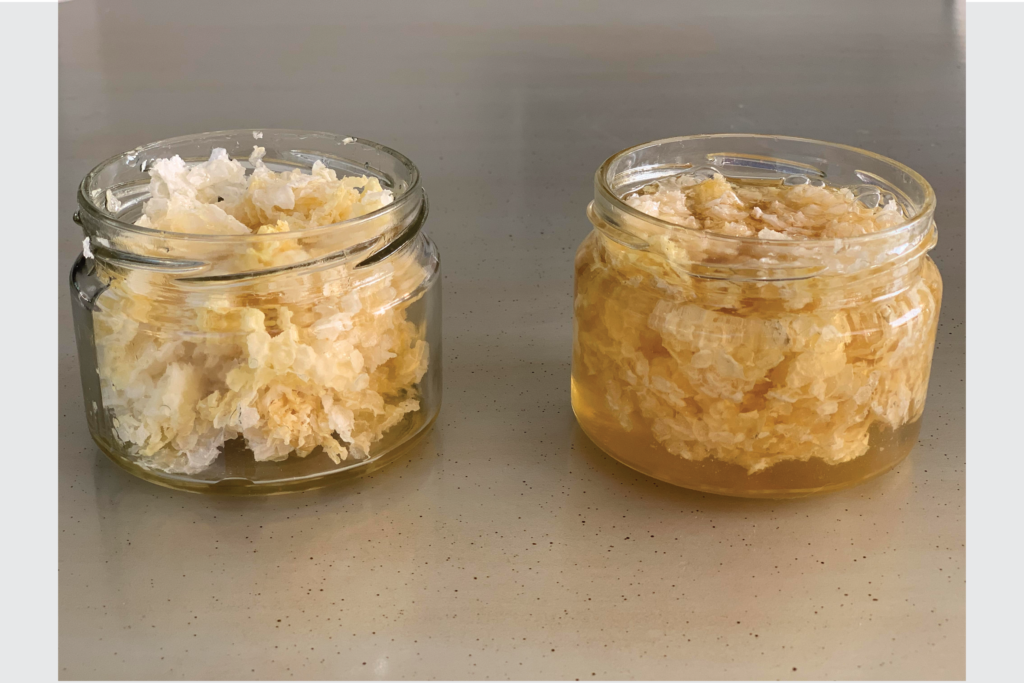
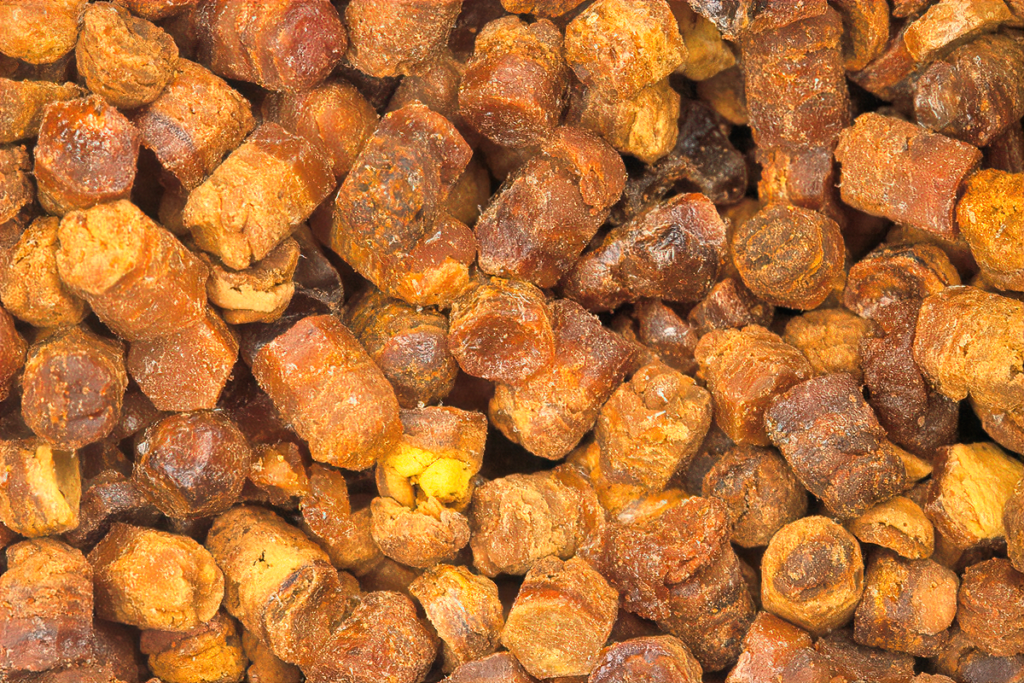
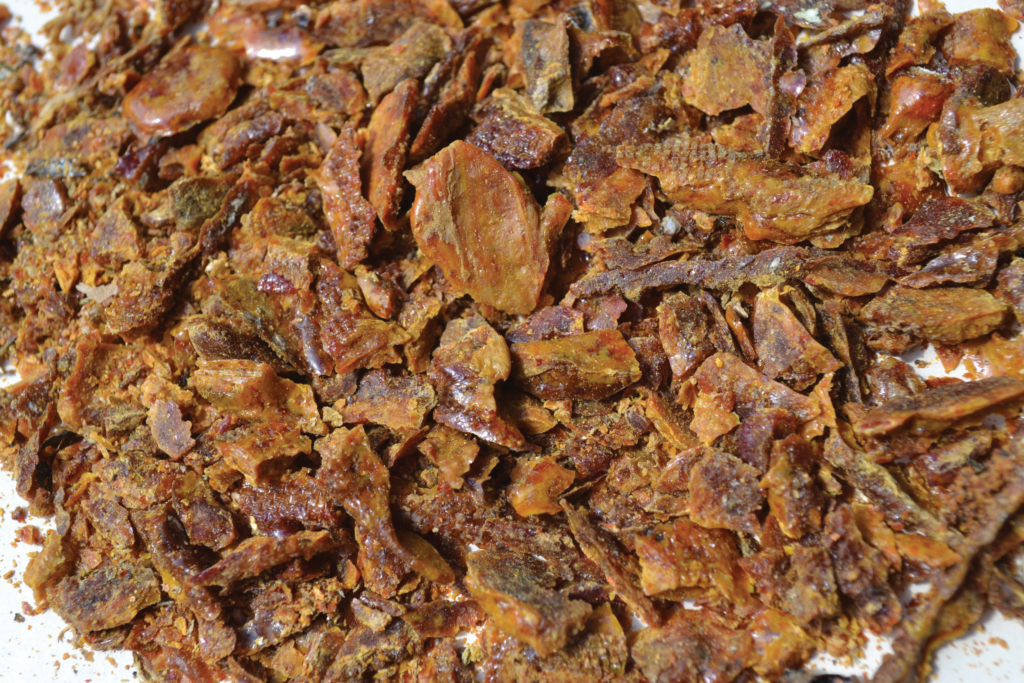
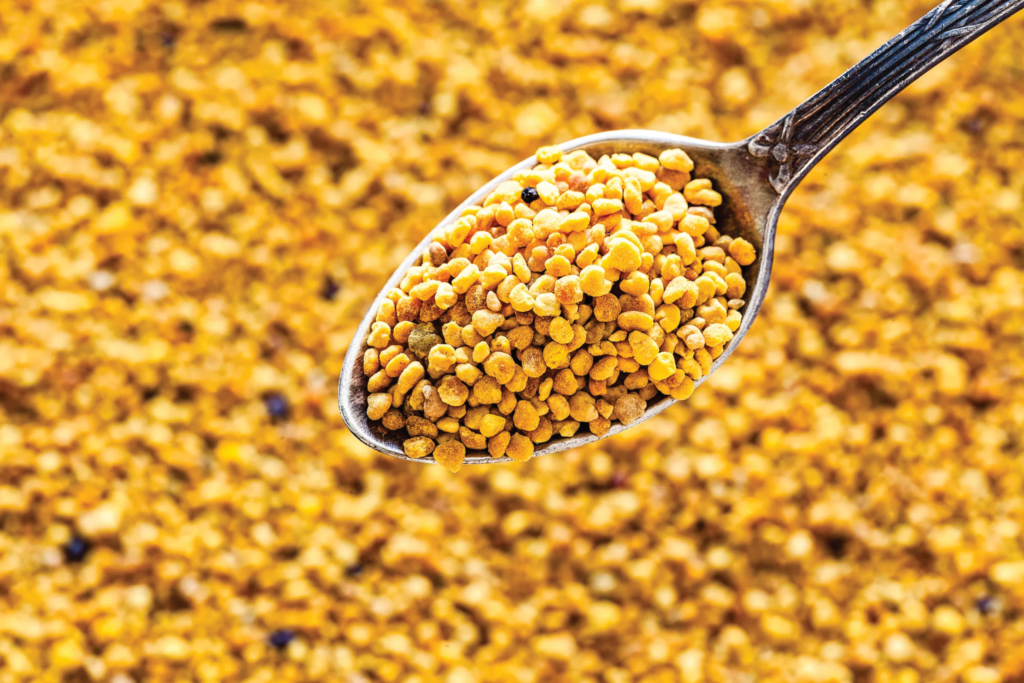

Honey
Honey - What Is It?
Honey – one of the most popular bee products, known for its unique taste and nutritional value. It is a natural sweet product created by worker bees from nectar or plant sap. Honey is used as an energy source, natural sweetener, and immune booster.
Honey Composition:
The composition of honey can vary depending on the plant species and region, but it typically contains:
- Carbohydrates: fructose and glucose (approximately 70-80%) that provide energy.
- Water: about 15-20%.
- Vitamins: B-complex vitamins, vitamin C, and others.
- Minerals: calcium, magnesium, iron, zinc, phosphorus, and more.
- Amino Acids: small amounts, but essential for bodily functions.
- Antioxidants: Flavonoids and other compounds that help fight free radicals.
- Enzymes: Naturally occurring enzymes in honey aid digestion.
Health Benefits of Honey:
Energy Source: Due to its high carbohydrate content, honey is an excellent source of energy, especially after physical activity or fatigue.
Immune System Support: Honey helps strengthen the immune system and increase resistance to infections.
Antioxidant Properties: Flavonoids and other compounds help combat free radicals and slow down aging processes.
Improves Digestion: Honey promotes healthy digestion and supports gut health.
Antibacterial Properties: Honey has natural antibacterial effects, helping to prevent infections and heal minor wounds.
Improves Sleep: Honey can help improve sleep quality, especially when consumed with warm water or tea before bedtime.
Soothes Cough and Sore Throat: Honey is a natural remedy for reducing cough and soothing sore throat.
How to Use Honey?
Honey can be consumed in various ways:
DirectlyEat it by the spoonful or as a topping for bread, cereals, or other foods.
Sweeten Beverages: Dissolve honey in warm water, tea, juices, or other drinks.
As a Food Supplement: Use honey as a natural sweetener instead of sugar.
Topical Use: Apply honey to the skin to soothe minor irritations or wounds.
Recommended Dosage:
Adults: 1-2 teaspoons per day.
Children: 1 teaspoon per day (not recommended for children under 1 year due to the risk of botulism).
Important to Know:
Honey may cause allergic reactions, especially in people with bee product allergies.
Not recommended for children under 1 year due to the risk of botulism.
Consult a healthcare provider before consuming honey regularly, especially if you have chronic health conditions or take medications.
History and Uses of Honey:
Honey has been valued for centuries for its taste and healing properties. It was used both as a food and a medicine. Today, honey continues to be widely used in traditional and alternative medicine as a natural way to boost health and improve overall well-being.
Honey is a wonderful natural bee product that can help improve overall health and provide the body with essential nutrients. It is especially valuable for those seeking natural ways to boost health and enhance their diet.

Beeswax
What is Beeswax?
Beeswax is a natural substance produced by worker bees in their body glands. It is used to build honeycombs, where the bee colony stores honey, propolis, and raises larvae. Beeswax is strong yet flexible and has many uses both in the beehive and in everyday human life.
Beeswax Composition:
The composition of beeswax can vary depending on the bee species and region, but it generally includes:
Wax acids: Approximately 70-80% wax acids that provide structure and strength.
Carbohydrates: A small amount of sugars that provide energy.
Lipids: Natural fats that help maintain flexibility.
Minerals: Calcium, magnesium, iron, and more.
Vitamins: Small amounts of vitamins, especially A and D.
Antioxidants: Compounds that help protect against free radicals.
Beeswax Benefits:
SkincareLike other bee products, beeswax is used in creams, balms, and lip balms due to its moisturizing and protective properties.
Antioxidant PropertiesBeeswax helps protect the skin from free radicals and slows down aging.
Reduces Inflammation: Beeswax can help reduce skin inflammation and irritation.
Protective Barrier: It forms a natural protective layer on the skin, guarding against external environmental factors.
Hive Construction: Beeswax is the main material for building honeycombs, where bees raise larvae and store honey.
Crafting and Handicrafts: Beeswax is used for making candles, sculptures, and other artisanal products.
How to Use Beeswax?
Beeswax can be used in various ways:
Cosmetics: As a primary ingredient in creams, balms, and lip care products.
Handicrafts: For making candles, sculptures, and other decorative items.
Skin Care: Applied directly to the skin to form a protective layer.
Beekeeping: Used for making wax sheets for beehives.
Important to Know:
Beeswax may cause allergic reactions, especially for those who are allergic to bee products.
Before using beeswax for skin care, it is recommended to perform an allergy test.
History and Uses of Beeswax:
Beeswax has been valued for centuries for its versatility and beneficial properties. It was used in medicine, craftsmanship, and today it is widely used in cosmetics, skincare products, and as a natural candle-making material.
Beeswax remains a remarkable natural bee product that continues to outperform synthetic wax alternatives.

Bee bread
What is Bee Bread?
Bee bread is a natural bee product made by worker bees from pollen mixed with honey and bee saliva. This mixture is fermented and stored in honeycomb cells, where it becomes the main source of protein for the bee colony during winter. Bee bread is rich in valuable nutrients, beneficial for both bees and humans.
Bee Bread Composition:
The composition of bee bread can vary depending on the region, plants, and bee species, but it typically includes:
Proteins: Approximately 20-30% proteins, essential for the health of both bees and humans.
Vitamins: A, B-complex (B1, B2, B6, B12), C, D, E, and K vitamins.
Minerals: Calcium, magnesium, iron, zinc, selenium, phosphorus, and more.
Amino Acids: All essential amino acids necessary for bodily functions.
Enzymes: Aid in digestion and nutrient absorption.
Antioxidants: Help combat free radicals and strengthen the immune system.
Health Benefits of Bee Bread:
Immune System Support: The combination of vitamins, minerals, and antioxidants helps strengthen the immune system and increase resistance to infections.
Energy Source: Bee bread is an excellent energy source, especially after physical exertion or fatigue.
Improves Digestion: The enzymes in bee bread promote healthy digestion and support gut health.
Antioxidant Properties: Helps protect cells from oxidative stress and slows down the aging process.
Reduces Inflammation: Bee bread has anti-inflammatory properties that can help reduce inflammation in the body.
Enhances Physical and Mental Endurance: Regular consumption of bee bread may improve physical and mental performance, reduce fatigue, and boost concentration.
How to Consume Bee Bread?
Bee bread can be consumed in various forms:
Pure Bee Bread: Can be chewed directly or mixed with food.
Bee Bread Capsules: A convenient way to consume bee bread as a dietary supplement.
Bee Bread Powder: Can be mixed into smoothies, yogurt, or other foods.
Bee Bread Extract: Used as a supplement or for topical use.
Recommended Dosage:
Pure Bee Bread: 1-2 teaspoons per day.
Capsules: Follow the manufacturer’s instructions, typically 1-2 capsules per day.
Powder: 1-2 teaspoons mixed into food or drink.
Important to Know:
Bee bread may cause allergic reactions, especially for those allergic to bee products.
Before starting regular bee bread consumption, consult a healthcare provider, especially if you have chronic health conditions or take medication.
History and Uses of Bee Bread:
Bee bread has been valued for centuries for its nutritional and healing properties. Today, it is widely used in both traditional and alternative medicine as a natural way to boost health and improve overall well-being.
Bee bread is a remarkable natural bee product that can help improve health and provide essential nutrients. It is particularly beneficial for those seeking natural ways to strengthen their health and enhance their diet.

Propolis or Bee Glue
What is Bee Propolis?
Bee propolis, also known as bee glue, is a natural product created by bees and has been known for centuries for its medicinal properties. It is a sticky, resinous substance collected by worker bees from plant buds, bark, and other parts of plants, then mixed with bee saliva and wax. Propolis is used to seal gaps in the hive, protect against diseases and pests, and also serves as a valuable product for human health. It has strong antibacterial, antiviral, and antifungal properties, making it a natural protective mechanism. People use propolis as a dietary supplement or for topical applications due to its medicinal qualities.
Propolis Composition:
The composition of propolis can vary depending on the region, plants, and bee species, but it typically includes:
Plant resins and gums (50-70 %)
Beeswax (30-50 %)
Essential oils (5-10 %)
Bee pollen (5-10 %)
Vitamins and minerals: A, B, C, E vitamins, zinc, magnesium, iron, and more.
Flavonoids: Natural antioxidants that boost the immune system.
Amino Acids: Essential amino acids necessary for bodily functions.
Propolio nauda sveikatai:
Immune System Support: Propolis helps strengthen the immune system, increasing resistance to infections and viruses.
Antibacterial Properties: Effective against bacteria, viruses, and fungi.
Antioxidant Properties: Flavonoids and other compounds help combat free radicals and slow down aging processes.
Reduces Inflammation: Propolis can help decrease various types of inflammation in the body, including skin and digestive issues.
Skin HealthApplied topically, propolis can aid in healing wounds, abscesses, and even minor burns.
Improves Digestion: Propolis can help regulate digestion and alleviate symptoms of gastrointestinal problems.
How to Use Propolis?
Propolis can be consumed in various forms:
Propolis Tincture: Typically used as a dietary supplement. A few drops can be added to water, tea, or honey.
Propolis Capsules: A convenient way to take propolis as a supplement.
Propolis Extract: Used as a supplement or for topical use.
Propolis Ointment or Cream: Used to treat skin issues.
Raw Propolis: Can be chewed directly or used as a food additive.
Recommended Dosage:
Tinktūra: 5-10 drops, mixed with water or tea, 1-2 times per day.
Capsules: Follow the manufacturer’s instructions, typically 1-2 capsules per day.
Topical Use: Apply directly to the affected skin area 1-2 times per day.
Important to Know:
Propolis may cause allergic reactions, especially for people allergic to bee products or tree resins.
Before using propolis regularly, consult a healthcare professional, especially if you have chronic conditions or take medications.
Propolio istorija ir naudojimas:
Propolis has been used since ancient times in Egypt, Greece, and Rome as a medicinal remedy. It was valued for its antiseptic and healing properties. Today, propolis is widely used in both traditional and alternative medicine as a natural way to boost health.
Bee propolis remains an exceptional natural product that can help enhance overall health and protect against various diseases.

Bee pollen
What is Bee Pollen?
Bee pollen is a natural product collected by bees, which is highly valuable for both bee and human health. These tiny granules are gathered by worker bees from flower blossoms and carried to the hive. Bee pollen is not only food for bees but also a nutritious superfood for humans, rich in proteins, vitamins, minerals, and antioxidants.
Bee Pollen Composition:
The composition of bee pollen can vary depending on the plant species and region, but it typically contains:
Proteins: Approximately 20-30% proteins, essential for both bees and human bodies. Bee pollen contains 5-7 times more amino acids than beef or eggs, as well as nucleoproteins and about 20% plant fats. kartus daugiau aminorugščių, negu jautienoje ir kiaušiniuose, be to, jose yra nukleino rūgščių ir nukleoproteidų, apie 20 proc. augalinių riebalų.
Vitamins: A, B1, B2, B6, C, D, E, and K vitamins.
Minerals: Calcium, magnesium, iron, zinc, selenium, and more.
Amino Acids: All essential amino acids necessary for bodily functions.
Antioxidants: Flavonoids and other compounds that help fight free radicals.
Carbohydrates: A source of energy.
Health Benefits of Bee Pollen:
Immune System Support: Due to its rich vitamin and mineral content, bee pollen helps strengthen the immune system and boost resistance to infections.
Energy Source: Bee pollen is an excellent source of energy, especially beneficial after physical activity or fatigue.
Antioxidant Properties: Helps protect cells from oxidative stress and slows down the aging process.
Improves Digestion: Bee pollen promotes healthy digestion and supports gut health.
Reduces Inflammation: Due to its anti-inflammatory properties, bee pollen can help reduce various inflammatory processes in the body.
Enhances Physical and Mental Endurance: Regular consumption of bee pollen may improve physical and mental performance, reduce fatigue, and boost concentration.
How to Use Bee Pollen?
Bee pollen can be consumed in various forms:
Pure Bee Pollen: Can be chewed directly or added to food.
Bee Pollen Capsules: A convenient way to take bee pollen as a dietary supplement.
Bee Pollen Powder: Can be mixed into smoothies, yogurt, or other foods.
Bee Pollent Extract: Used as a supplement or for topical use.
Recommended Dosage:
Pure Bee Pollen: 1-2 teaspoons per day.
Capsules: Follow the manufacturer’s instructions, typically 1-2 capsules per day.
Powder: 1-2 teaspoons mixed into food or drink.
Important to Know:
Bee pollen may cause allergic reactions, especially for those allergic to bee products or pollen.
Before starting regular bee pollen consumption, consult a healthcare provider, especially if you have chronic health conditions or take medication.
Žiedadulkių istorija ir naudojimas:
Bee pollen has been valued since ancient times for its nutritional and healing properties. Today, it is widely used in both traditional and alternative medicine as a natural way to boost health and improve overall well-being.
Bee pollen is a remarkable natural bee product that can help improve health and provide essential nutrients. It is especially beneficial for those seeking natural ways to strengthen their health and enrich their diet.
